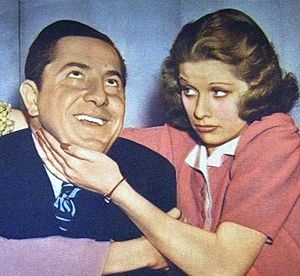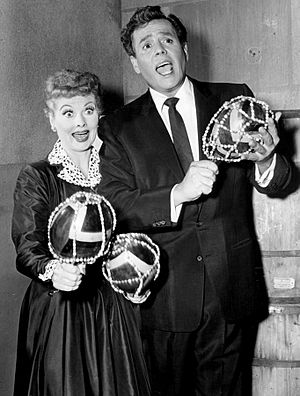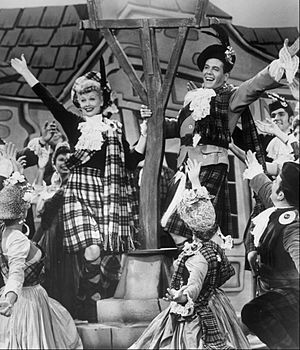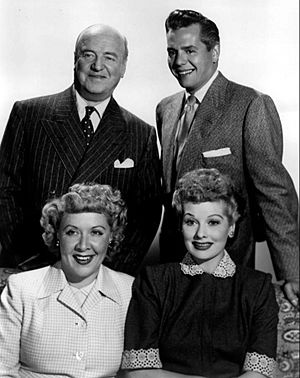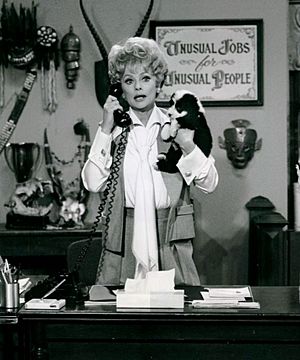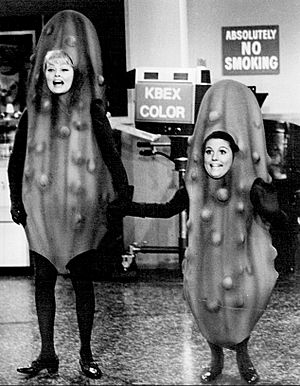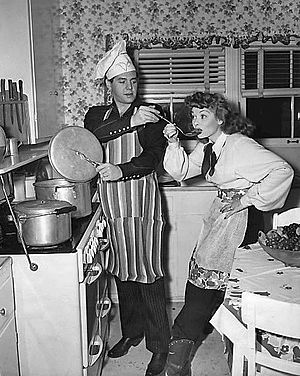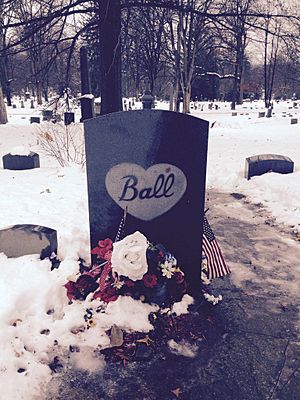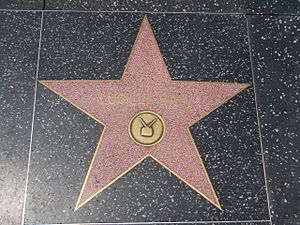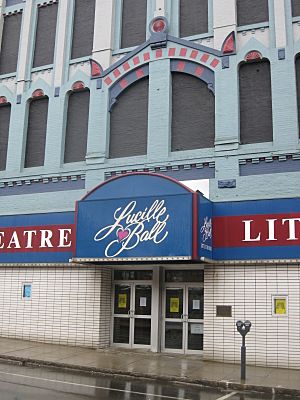Lucille Ball facts for kids
Quick facts for kids
Lucille Ball
|
|
|---|---|
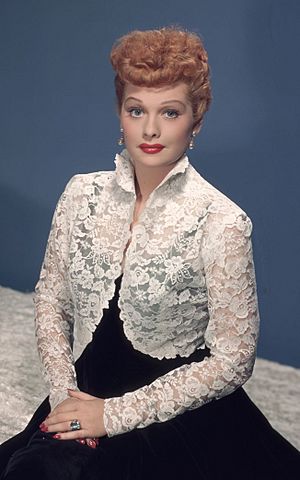
Ball in 1955
|
|
| Born |
Lucille Désirée Ball
August 6, 1911 Jamestown, New York, U.S.
|
| Died | April 26, 1989 (aged 77) Los Angeles, California, U.S.
|
| Burial place | Lake View Cemetery, Jamestown, New York, U.S. |
| Occupation |
|
| Years active | 1929–1989 |
| Known for |
|
| Spouse(s) |
|
| Children | |
| Relatives |
|
| Signature | |
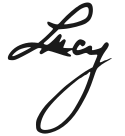 |
|
Lucille Désirée Ball (born August 6, 1911 – died April 26, 1989) was a famous American actress, comedian, and producer. She is best known for her role as Lucy Ricardo in the classic TV show I Love Lucy. She won many awards, including five Primetime Emmy Awards, the Golden Globe Cecil B. DeMille Award, and two stars on the Hollywood Walk of Fame. She was also honored with the Crystal Award and was inducted into the Television Hall of Fame.
Lucille Ball started her career in 1929 as a model. Soon after, she began acting on Broadway using the name Diane Belmont. In the 1930s and 1940s, she appeared in many films, often in smaller roles. During this time, she met Cuban bandleader Desi Arnaz, and they got married in November 1940.
In the 1950s, Ball became a huge TV star. She and Arnaz created the popular sitcom I Love Lucy. They had two children, Lucie (born 1951) and Desi Arnaz Jr. (born 1953). Lucille and Desi divorced in 1960, and she later married comedian Gary Morton in 1961.
In 1962, Lucille Ball made history by becoming the first woman to run a major television studio, Desilu Productions. This studio produced many popular shows like Mission: Impossible and Star Trek. After I Love Lucy, she starred in other successful sitcoms, including The Lucy Show and Here's Lucy, which even featured her real-life children.
Lucille Ball continued acting in TV films, like Stone Pillow in 1985. Her last sitcom, Life with Lucy, was not as popular and was canceled quickly. She passed away in April 1989 at the age of 77.
Contents
Early Life and Childhood
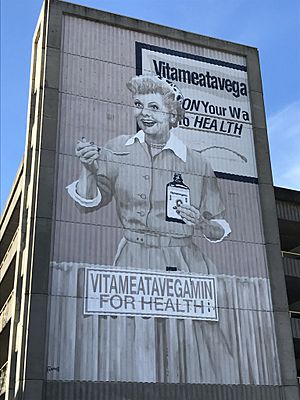
Lucille Désirée Ball was born on August 6, 1911, in Jamestown, New York. Her father, Henry Durrell "Had" Ball, worked for the telephone company, and her mother was Désirée Evelyn "DeDe" Ball. Her family was mostly English, with some Scottish, French, and Irish roots. Some of her ancestors were among the first settlers in America.
Because of her father's job, Lucy's family moved often when she was very young. They lived in places like Anaconda, Montana, and Trenton, New Jersey. When Lucy was only three years old, her father died from typhoid fever in 1915. Her mother was pregnant with Lucy's brother, Fred Ball, at the time.
After her father's death, Lucy's mother moved back to New York. Lucy and her brother Fred were raised by their maternal grandparents in Celoron, New York. This was a fun summer resort village on Chautauqua Lake. Lucy loved Celoron Park, which had a boardwalk, a roller coaster, and a stage for shows.
Later, Lucy's mother married Edward Peterson. While her parents looked for work, Lucy and Fred stayed with Peterson's parents. These step-grandparents were very strict. They did not like Lucy looking at herself in mirrors.
When Lucy was 12, her stepfather encouraged her to try out for a show. She realized that performing was a great way to get attention and praise. In 1927, her family had to move to a smaller apartment in Jamestown.
Lucille Ball's Career Journey
Starting Out in Show Business
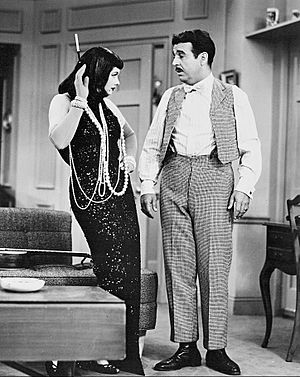
In 1926, when she was 14, Lucille Ball's mother enrolled her in the John Murray Anderson School for the Dramatic Arts in New York City. Another famous actress, Bette Davis, was also a student there. Lucy's teachers did not think she would be successful in entertainment.
Despite the criticism, Lucy was determined to prove them wrong. She returned to New York City in 1928 and started working as a model for Hattie Carnegie. Carnegie told Lucy to bleach her brown hair blonde, which she did. Lucy learned a lot about fashion and poise during this time.
From Films to Radio
In 1932, Lucy moved back to New York to pursue acting. She worked as a model and a cigarette girl to support herself. She got some chorus roles on Broadway, but they didn't last. She was even fired from a few shows.
After a small, uncredited role in the film Roman Scandals (1933), Ball moved to Hollywood for good. She got many small movie roles in the 1930s with RKO Pictures. She appeared in short comedies with The Three Stooges and a movie with the Marx Brothers. Her first credited role was in Chatterbox in 1936. She also appeared in musicals with Fred Astaire and Ginger Rogers. In 1937, she had a bigger role in Stage Door with Ginger Rogers, who was a distant cousin.
In the 1940s, Ball starred in the musical film Too Many Girls (1940). This is where she met and fell in love with Desi Arnaz. She then signed with Metro-Goldwyn-Mayer, but she never became a huge star there. She was sometimes called "Queen of the B's" because she starred in many B-movies.
Like many actors, Lucy also worked in radio. She appeared on The Phil Baker Show and The Wonder Show. This is where she started her long friendship with announcer Gale Gordon. In 1948, Ball was cast as Liz Cooper in My Favorite Husband, a radio comedy for CBS Radio.
The I Love Lucy Years
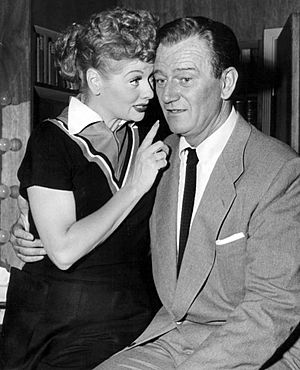
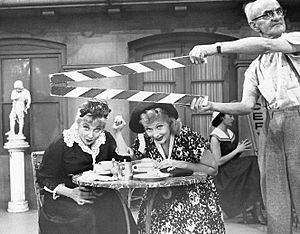
My Favorite Husband was very popular, and CBS wanted to turn it into a TV show. Lucille agreed, but only if her real-life husband, Desi Arnaz, could star with her. CBS executives were worried because they thought people wouldn't accept an American redhead and a Cuban man as a couple.
To convince CBS, Lucy and Desi performed a vaudeville act together. Lucy played a funny housewife who wanted to be in Desi's show. Their act was a huge hit, so CBS decided to put I Love Lucy on TV.
I Love Lucy became a massive success. It also helped Lucille and Desi work together, as their busy schedules often kept them apart. Lucille Ball made history by becoming the first woman to lead a TV production company, Desilu Productions, which she owned with Desi. After their divorce, she bought his share and ran the studio herself.
Desilu and I Love Lucy introduced new ways of making TV shows. They were pioneers in filming before a live studio audience with multiple cameras. They also used different sets right next to each other.
During the show's run, Lucy and Desi wanted to stay in Los Angeles. However, live TV shows were difficult because of time zones. To solve this, they agreed to take less pay to film the show on high-quality 35mm film. Desilu kept the rights to each episode after it aired. This was a smart move because CBS later bought the rights back for a lot of money. This money helped Ball and Arnaz buy the former RKO Pictures studios, which became Desilu Studios.
I Love Lucy was the top-rated show in the U.S. for most of its time on air. During breaks from the show, Lucy and Desi also starred in two movies: The Long, Long Trailer (1954) and Forever, Darling (1956). After I Love Lucy ended in 1957, the main cast continued in occasional hour-long specials called The Lucy–Desi Comedy Hour until 1960.
Desilu Productions also created other popular shows like The Untouchables, Star Trek, and Mission: Impossible. In 1967, Lucy sold her shares of the studio for $17 million. The studio was then renamed Paramount Television.
Later Career and Legacy
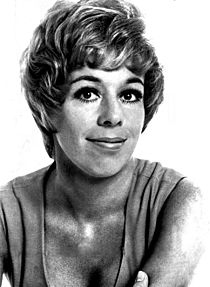
In the 1960s, Lucille Ball starred in the Broadway musical Wildcat. She also made more movies, including Yours, Mine, and Ours (1968) and the musical Mame (1974). She had two more successful TV sitcoms for CBS: The Lucy Show (1962–68) and Here's Lucy (1968–74). Both shows featured her longtime co-star Gale Gordon. Here's Lucy also included her real-life children, Lucie Arnaz and Desi Arnaz, Jr.
Lucille Ball was a close friend and mentor to comedian Carol Burnett. Ball often appeared on Burnett's TV specials, and Burnett appeared on The Lucy Show. They remained close friends until Ball's death.
In the 1980s, Ball tried to restart her TV career. She hosted a two-part special for Three's Company in 1982. In 1985, she starred in a dramatic TV film called Stone Pillow, playing an elderly homeless woman. Her 1986 sitcom comeback, Life with Lucy, was not well-received and was canceled quickly.
Lucille Ball's last public appearance was at the 1989 Academy Awards telecast, just one month before she passed away. She received a standing ovation.
Personal Life and Family
Lucille Ball met Desi Arnaz in 1940 while filming Too Many Girls. They quickly fell in love and got married on November 30, 1940. Desi was drafted into the Army in 1942, but he stayed in Los Angeles. He organized shows for wounded soldiers.
Lucy filed for divorce in 1944, but she and Desi got back together.
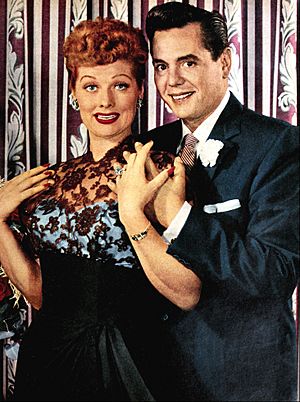
On July 17, 1951, just before her 40th birthday, Lucy gave birth to their daughter, Lucie Désirée Arnaz. About a year and a half later, she gave birth to their son, Desiderio Alberto Arnaz IV, known as Desi Jr.
When Lucy was pregnant with Desi Jr., the writers decided to include her pregnancy in the I Love Lucy show. CBS was hesitant to show a pregnant woman on TV or even use the word "pregnant." After getting approval from religious leaders, the network allowed the storyline, but they insisted on using the word "expecting" instead of "pregnant."
The episode where Lucy Ricardo gave birth to "Little Ricky" aired on January 19, 1953. An amazing 44 million viewers watched it. On the very same day, Lucille Ball gave birth to her real-life son, Desi Jr., in Los Angeles. This birth made the cover of the first issue of TV Guide.
By the late 1950s, Desilu had become a very large company, which caused a lot of stress for both Lucy and Desi. On March 3, 1960, they divorced. However, they remained good friends until Desi's death in 1986 and often spoke kindly of each other. In her later TV shows, Lucy always played an unmarried woman, often a widow.
In 1961, Lucy starred in the Broadway musical Wildcat. Her co-star, Paula Stewart, introduced her to Gary Morton, a comedian who was 13 years younger than Lucy. Morton and Ball got married on November 19, 1961. Lucy said that Gary had never seen an episode of I Love Lucy because he was always working. She brought him into her production company, taught him about TV, and he eventually became a producer.
Death and Memorials
On April 18, 1989, Lucille Ball was taken to the hospital because of chest pains. She had surgery to fix a problem with her aorta.
Sadly, on April 26, 1989, Lucille Ball passed away at the age of 77. Doctors determined she died from a ruptured abdominal aortic aneurysm, which was not directly related to her surgery. She had been a heavy smoker for most of her life.
Three memorial services were held for Lucille Ball. She was cremated, and her ashes were first buried in Los Angeles. In 2002, her and her mother's remains were moved to the Hunt family plot at Lake View Cemetery in Jamestown, New York, as Lucy had wished to be buried near her mother. Her brother's remains were also buried there in 2007.
Recognition and Honors
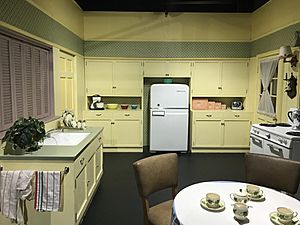
Lucille Ball received many tributes and awards during her life and after her death. On February 8, 1960, she received two stars on the Hollywood Walk of Fame. One was for her work in movies, and the other was for her contributions to television.
In 1986, Ball was honored at the Kennedy Center Honors. This event was very special because Desi Arnaz was supposed to introduce her, but he had passed away just five days earlier. Their friend Robert Stack gave the introduction instead.
After her death, President George H. W. Bush awarded her the Presidential Medal of Freedom on July 6, 1989.
Lucille Ball's hometown of Jamestown, New York, has a museum dedicated to her and Desi Arnaz, called the Lucille Ball Desi Arnaz Museum & Center for Comedy. The local theater was renamed the Lucille Ball Little Theatre in her honor, and the street she was born on was renamed Lucy Street.
Time magazine included Lucille Ball in their list of the "100 Most Important People of the Century."
On June 7, 1990, Universal Studios Florida opened an attraction called Lucy – A Tribute. It showed clips from her shows, facts about her life, and items she owned. It was open until 2015.
In 2001, the United States Postal Service honored what would have been Ball's 90th birthday with a commemorative stamp.
Lucille Ball appeared on 39 covers of TV Guide, more than anyone else. TV Guide also named her the "Greatest TV Star of All Time" and ranked I Love Lucy as the second-best TV program in American history.
For her contributions to the Women's Movement, Ball was inducted into the National Women's Hall of Fame in 2001.
On August 6, 2011, Google's homepage featured an interactive doodle of classic moments from I Love Lucy to celebrate what would have been her 100th birthday.
There are two statues of Lucille Ball in Celoron, New York. One, nicknamed "Scary Lucy," became a local tourist attraction. A new statue was added in 2016, but the old one was kept nearby.
Lucille Ball has been portrayed by several actresses in films and plays. Nicole Kidman played her in the 2021 film Being the Ricardos, and was nominated for an Academy Award for her performance.
Lucille Ball was also known for supporting gay rights. She stated in an interview that she believed many gifted people were homosexual and that it was "perfectly all right."
Awards and Nominations
| Association | Year | Category | Nominated Work | Result |
|---|---|---|---|---|
| American Comedy Awards | 1987 | Lifetime Achievement Award in Comedy | Won | |
| Golden Apple Awards | 1963 | Most Cooperative Actress | Nominated | |
| 1973 | Female Star of the Year | Won | ||
| Golden Globes | 1961 | Best Actress — Motion Picture Comedy or Musical | The Facts of Life | Nominated |
| 1968 | Best TV Star — Female | The Lucy Show | ||
| 1969 | Best Actress — Motion Picture Comedy or Musical | Yours, Mine and Ours | ||
| 1970 | Best Actress — Television Comedy or Musical | Here's Lucy | ||
| 1972 | ||||
| 1975 | Best Actress — Motion Picture Comedy or Musical | Mame | ||
| 1979 | Cecil B. DeMille Award | Won | ||
| Hasty Pudding Theatricals | 1988 | Woman of the Year | ||
| The Kennedy Center Honors | 1986 | Kennedy Center Honors | ||
| Laurel Awards | 1961 | Top Female Comedy Performance | The Facts of Life | Nominated |
| 1968 | Female Comedy Performance | Yours, Mine and Ours | Won | |
| OFTA Television Awards | 1997 | Television Hall of Fame — Actors and Actresses | ||
| Palm Springs International Film Festival | 1990 | Desert Palm Achievement Award | ||
| Primetime Emmy Awards | 1952 | Best Comedian or Comedienne | Nominated | |
| 1953 | Best Comedienne | Won | ||
| Most Outstanding Personality | Nominated | |||
| 1954 | Best Female Star of Regular Series | I Love Lucy | ||
| 1955 | Best Actress Starring in a Regular Series | |||
| 1956 | Best Comedienne | |||
| Best Actress — Continuing Performance | I Love Lucy | Won | ||
| 1957 | Best Continuing Performance by a Comedienne in a Series | Nominated | ||
| 1958 | Best Continuing Performance (Female) in a Series by a Comedienne, Singer, Hostess, Dancer, M.C. Announcer, Narrator, Panelist, or any Person who essentially Plays Herself' | |||
| 1963 | Outstanding Continued Performance by an Actress in a Series (Lead) | The Lucy Show | ||
| 1966 | Outstanding Continued Performance by an Actress in a Leading Role in a Comedy Series | |||
| 1967 | Won | |||
| 1968 | ||||
| 1989 | Governor's Award | |||
| TCA Awards | 1989 | Career Achievement Award | ||
| TV Land Awards | 2007 | Legacy of Laughter Award | ||
| Walk of Fame | 1960 | Television — 6100 Hollywood, Blvd. | ||
| Motion Picture — 6436 Hollywood, Blvd. | ||||
| Women in Film Crystal + Lucy Awards | 1977 | Crystal Award | ||
| International Radio and Television Society | 1971 | International Radio and Television Society - Gold Medal | ||
Images for kids
-
Lucille Ball Metro-Goldwyn-Mayer Postcard
See also
 In Spanish: Lucille Ball para niños
In Spanish: Lucille Ball para niños
 | Madam C. J. Walker |
 | Janet Emerson Bashen |
 | Annie Turnbo Malone |
 | Maggie L. Walker |


